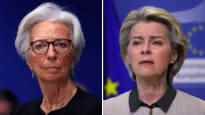Many things will change again in Europe as a result of the war. Here’s a taste of the newsletter, which covers key EU issues every Friday. You can order the entire letter to your email.
Rikhard Husu,
Anna Karismo
Good morning at the EU summit,
The meeting is one of the highlights of the French EU Presidency. Leaders are expected to take a line on issues such as defense and energy supply. In practice, there is talk of getting rid of Russian oil and gas as quickly as possible.
The transition requires additional investments in the green transition. EU countries also need to find new energy suppliers. Of course, this is not free, and the meeting will negotiate the financing of the investments.
France is lobbying behind the scenes to increase corporate debt. A role model is a recovery tool to offset the economic consequences of the corona. The countries of southern Europe have advocated more solidarity as a solution to Europe’s economic problems.
In Northern Europe, the attitude towards joint borrowing is more subdued. Promises about the one-off nature of the recovery tool are hard to come by.
However, with the Russian invasion, Europe has entered a new era that requires fresh thinking and breaking taboos from policymakers. This is illustrated by the historic decisions that the EU has taken in recent weeks. Read more about how the decisions were made here.
What is remarkable is the unity and speed with which the EU has acted over the past few weeks. Russia’s challenge may increase the flexibility of the member states and their desire to work together in the economic sphere as well.
Next, read another week’s rags from the news, my colleague in Pasila, editor Anna Karismo, has put together this below.
PS Please note that the renewed European letter will henceforth only be sent in full by e-mail. A condensed version will be published on ‘s website. You can order the letter here (you will switch to another service).
Next week: Citizens’ aspirations for the EU will begin to take shape at the conference on the future
On the table of ministers this time are issues related to working life, such as gender equality on company boards. Read more about the EU’s planned quotas for women here.
Citizens’ opinions on the development of the EU have been asked on their own website throughout the year. Following the discussions, the future conference will make recommendations to the EU institutions. They will be adopted at the end of March at the future session of the Conference.
The contents of the letter can be discussed until 11 pm tomorrow Saturday night.
